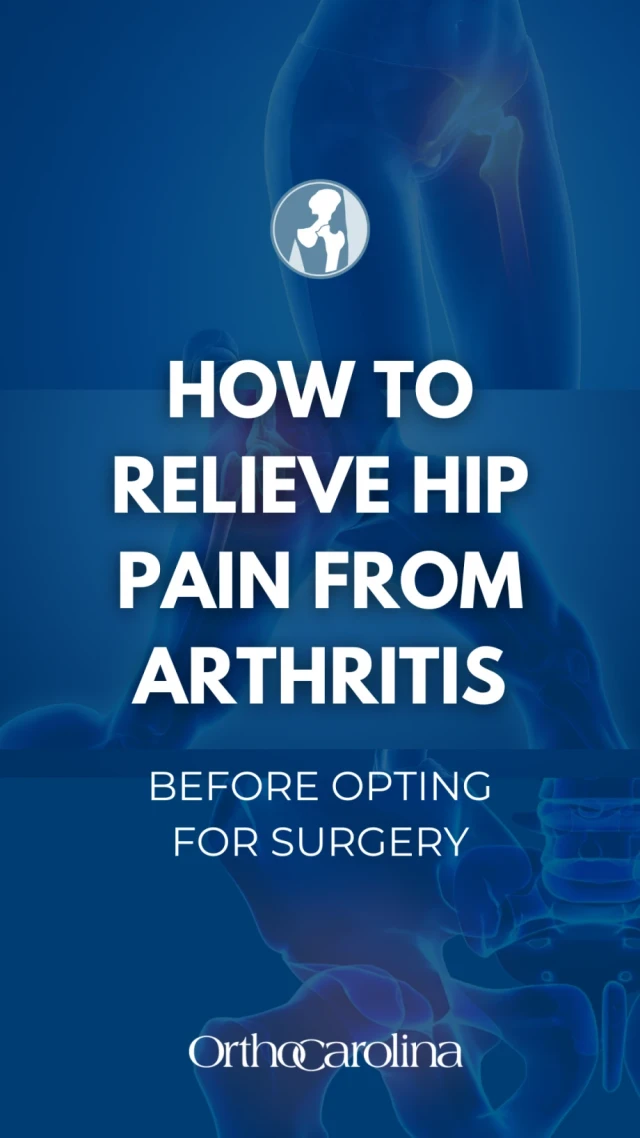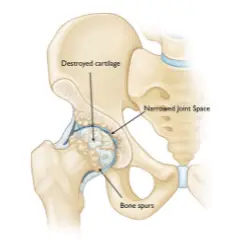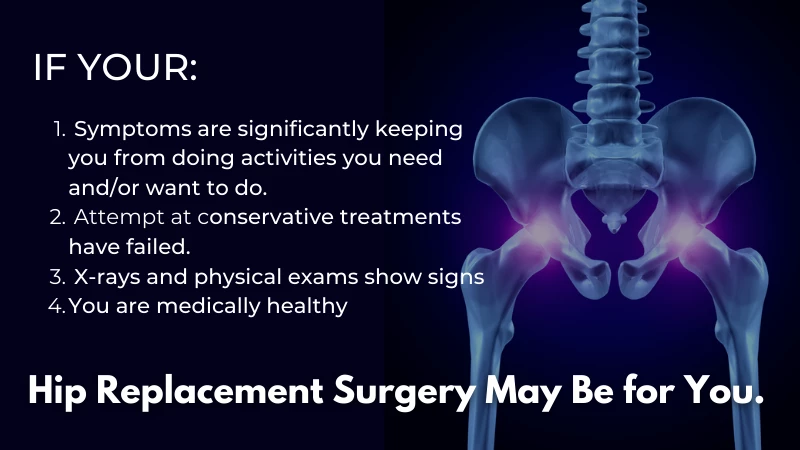
Hip pain - what is the source?
There are many different locations around the hip where pain can present, here are the 3 most common:
- Hip joint proper (the ball and socket articulation) most commonly manifests as groin pain in the front of the hip. This is often the origination of hip osteoarthritis pain and can be associated with the front of thigh pain and even pain that radiates down to the knee as well.
- Lateral or side of hip pain may indicate an issue such as bursitis or abductor tendon issues.
- Back of hip pain may come from the hip joint in certain instances but also is commonly a symptom of low back / lumbar spine issues. In particular, if there are associated shooting or radiating pains down the leg (sciatica-type symptoms) this is very suggestive of a low back issue.In short, identifying the source and cause of the hip pain is the first step in guiding treatment - this is best accomplished through a good, thorough physical exam with an orthopedist along with X-rays of the hip and/or low back, if indicated, to evaluate for any obvious structural issues.

What is Hip Osteoarthritis?

Osteoarthritis, sometimes called "wear-and-tear arthritis," is a common condition that many people develop as they age. It can occur in any joint in the body, but most often develops in weight-bearing joints, such as the hip. Frequently associated with pain and stiffness in the joints, often getting in the way of completion of everyday tasks. (source)
With Osteoarthritis of the hip, the cartilage in the hip joint gradually wears away over time. As the cartilage wears away, it becomes frayed and rough, and the protective joint space between the bones decreases. This can result in bone rubbing on bone. To make up for the lost cartilage, the damaged bones may start to grow outward and form bone spurs (osteophytes). (source)
Hip osteoarthritis can have sudden onset but most often worsens over time, making time 'of-the-essence' to start treatment. Whether hip replacement surgery is for you or not will always be up to you + your orthopedic team, but we will cover some additional options to try before booking your operation date.
Hip Pain from Arthritis
For hip arthritis, there are essentially 2 broad treatment categories available - conservative/nonsurgical treatments and surgery in the form of total hip replacement.
Conservative, nonsurgical treatment options include:
- Oral anti-inflammatory medications - prescription such as meloxicam, Voltaren, Celebrex OR over-the-counter options such as ibuprofen, naproxen. Tylenol is also beneficial
- Physical therapy and home exercise programs may be beneficial to strengthen muscles around the hip and improve flexibility. For severe hip arthritis, this may cause more pain and be very difficult, so I would not recommend this option if the pain is severe during or after activity.
- Gravity - reducing excess body weight and therefore the patient's relationship to gravity, could reduce the forces placed on the hip joints with walking, climbing stairs, and other daily activities. This alone could significantly help the frequency and intensity of symptoms.
- Steroid (cortisone) injections - unfortunately, steroid injections for the hip are typically not a great long-term treatment option for hip arthritis pain. They may temporarily alleviate symptoms of hip arthritis in mild to moderate cases. These are typically reserved for patients who are looking for short-term temporary relief or who are not candidates for surgery and have exhausted other treatment options. Occasionally cortisone injections in the hip may be used for diagnostic purposes, to confirm that symptoms are indeed coming from the hip joint articulation proper instead of another source.
- A side note regarding other types of injections - viscosupplementation (gel) injections, platelet-rich plasma, stem cell therapies - these injections have not been shown in the literature to be reliably beneficial for treating hip arthritis and are not routinely recommended.
Deciding between surgery versus continued conservative treatments:
4 considerations when counseling patients on the decision for proceeding with hip replacement surgery
- Symptoms (pain, stiffness, immobility) are significantly limiting to activities or functions on a daily basis. These symptoms keep you from doing activities you need and/or want to do.
- Conservative treatments have been attempted and failed - oral NSAIDs, PT/exercises, steroid injections, etc
- X-rays and physical exams are consistent with a hip joint etiology and demonstrate advanced osteoarthritis
- You are medically healthy and appropriately optimized to undergo a total hip replacement surgery

If these conservative treatments fail to provide adequate relief, when appropriately indicated, total hip replacement is an excellent operation with very high patient satisfaction. If you are curious if it is time for hip replacement surgery, tap 'schedule an appointment' at the bottom of this page and see one of OrthoCarolina's hip specialists, such as Dr. Greg Kurkis who was our orthopedic expert for this article, as soon as tomorrow in some cases!

This information is provided as an educational service and is not intended to serve as medical advice. If you are seeking specific orthopedic advice or assistance, please consult with your OrthoCarolina physician or locate one in your area through OrthoCarolina’s website at www.OrthoCarolina.com.
Comments
July 30, 2022
August 05, 2022
Back




October 18, 2023